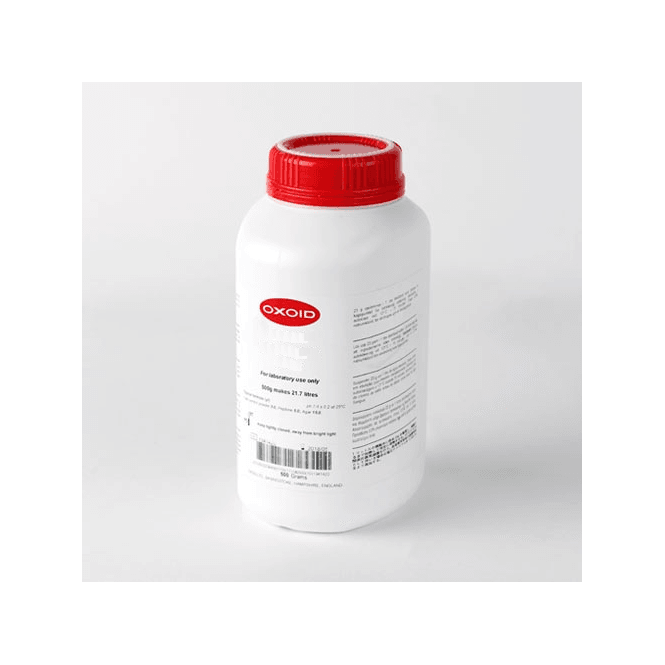Thermo Scientific™ Oxoid™ Tryptone Water (Dehydrated)
Catalog No :
CAS Number :
Brand :
In Stock
Specifications:
| Application | Microbiology | ||
| Storage Temperature | Room Temperature | ||
| Product Type | Culture Medium | Forms | Powder |
| Product Brand | Thermo Fisher Scientific™ | ||
| Product Grade | Microbiology grade | ||
Thermo Scientific™ Oxoid™ Tryptone Water is a liquid medium designed for the production and detection of indole by microorganisms. Its high content of tryptophan makes it a reliable substrate for performing indole tests, widely used in the classification and identification of bacteria.
Key Features:
- Reliable Substrate:
- High tryptophan content ensures accurate results in indole production tests, outperforming Peptone Water for this application.
- Wide Application:
- Used for the classification and identification of microorganisms capable of indole production.
- Detects Escherichia coli specifically at 44°C, facilitating its identification in water testing.
- Standardized Methodology:
- Compatible with Kovac's reagent and Ehrlich reagent for indole detection.
- Quality-Controlled Formula:
- Supports growth and consistent indole production in standard bacterial strains.
Typical Formula (per liter):
| Component | Amount (g/L) |
|---|---|
| Tryptone | 10.0 |
| Sodium Chloride | 5.0 |
| pH (at 25°C) | 7.5 ± 0.2 |
Preparation Instructions:
- Reconstitution:
- Dissolve 15 g of Tryptone Water powder in 1 liter of distilled water.
- Sterilization:
- Autoclave at 121°C for 15 minutes.
- Dispensing:
- Distribute into final containers before autoclaving.
Indole Detection Technique:
Using Kovac's Reagent:
- Preparation of Reagent:
- 5 g paradimethylaminobenzaldehyde, 75 mL amyl alcohol, 25 mL concentrated HCl.
- Procedure:
- Inoculate Tryptone Water tubes with test organism and incubate at 35°C for 24–48 hours.
- Add 0.2 mL Kovac's reagent, shake, and let stand for 10 minutes.
- A dark red layer indicates a positive indole reaction.
Using Ehrlich Reagent:
- Preparation of Reagent:
- 4 g paradimethylaminobenzaldehyde, 380 mL absolute alcohol, 80 mL concentrated HCl.
- Procedure:
- Inoculate and incubate as above.
- Add an equal volume of reagent to the culture; a rose color indicates indole presence.
- Alternatively, extract indole using ether and test with Ehrlich reagent.
Applications:
- Water and Wastewater Testing:
- Indole production at 44°C serves as a specific test for Escherichia coli.
- Microbial Identification:
- Differentiates bacteria based on their ability to degrade tryptophan into indole.
- Clinical and Food Microbiology:
- Assists in identifying enteric bacteria in various samples.
Quality Control:
| Control | Expected Results |
|---|---|
| Escherichia coli ATCC® 25922 | Turbid growth; indole positive |
| Enterobacter aerogenes ATCC® 13048 | Turbid growth; indole negative |
Storage and Shelf Life:
- Dehydrated Medium: Store at 10–30°C in a dry environment.
- Prepared Medium: Store at room temperature, away from light.
| Form | Description |
|---|---|
| Dehydrated Medium | Straw-colored, free-flowing powder |
| Prepared Medium | Light straw-colored solution |
Advantages:
| Feature | Benefit |
|---|---|
| High Tryptophan Content | Reliable for indole production and detection. |
| Standardized Formulation | Supports consistent results across tests. |
| Compatibility with Indole Tests | Works seamlessly with Kovac’s and Ehrlich reagents. |
Precautions:
- Perform sterility tests in strict aseptic conditions.
- Ensure proper disposal of waste according to local regulations.
References:
- American Public Health Association (1998). Standard Methods for the Examination of Water and Wastewater. 20th Edition, APHA Inc., Washington DC.
- Farmer J.J. III et al. (1985). Journal of Clinical Microbiology. 21: 46-76.
- DHSS (1982). The Bacteriological Examination of Drinking Water Supplies. HMSO, London.
Thermo Scientific™ Oxoid™ Tryptone Water offers a reliable solution for the detection of indole production, supporting microbiological identification in clinical, food, and water testing laboratories.




 0
0
